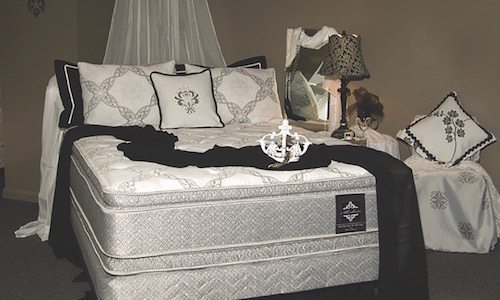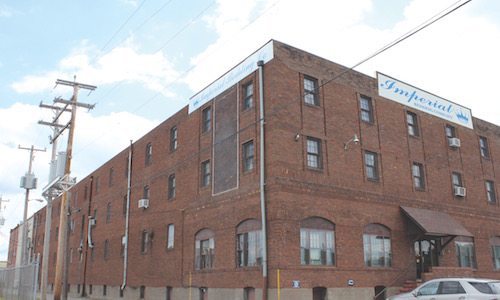
Mattress manufacturer Imperial Bedding Co. concentrates on two-sided innerspring and foam mattresses, a rarity in the bedding industry.
Regional mattress producer concentrates on quality
BY DOROTHY WHITCOMB
After surviving the economic pressures of the Great Recession, Imperial Bedding Co., an independent mattress manufacturer in Huntington, West Virginia, is focusing on diversifying its product line and expanding its retail base. It will continue to position itself, however, as an important regional source for the high-quality, two-sided bedding for which it has long been known, says President Ronnie Rowe.
“During the recession, we had an unbelievable amount of pressure from the name brands,” Rowe says. “The thing that helped us sustain ourselves was our independence. We make our own springs and make ultra-premium beds with ultra-premium foams that stay sold and last forever.”
Founding values
Rowe and his mother, Evelyn Cochran, founded Imperial Bedding 46 years ago on the principles of quality and independence and, through the years, they built a culture for their company that’s grounded in hard work and pride in its American-made products. They also place a high value on teamwork and human dignity.

One of Imperial Bedding Co.’s advantages over its competition is its ability to make its own spring units, demonstrated here by Bill Jenkins, Matrix coil machine operator.
“We are honest and fair and are constantly trying to make things better for our employees,” Rowe says.
When Cochran died in 2002, Rowe took the company’s helm. He and his sister’s family are now Imperial Bedding’s sole owners.
The company operates from a 134,000-square-foot facility that stretches the depth of an entire city block in Huntington. Two-thirds of the space is devoted to mattress manufacturing. Another 10,000 square feet are set aside for producing Imperial’s proprietary T-Coil 8-inch and Matrix RC 6-inch alternating innerspring systems; 20,000 square feet are used to store foam. The balance of the building contains the company’s offices. The facility, Rowe says, has the capacity to produce about 1,000 units per day. The company also has its own shipping fleet.
Imperial employs 49 people, which is down from its pre-recessionary average of 80 employees—a situation not unusual among independent bedding makers. Five independent sales representatives, who fan out to cover an area that extends about 300 miles from Huntington, also work for the company.
The roots of new growth
Although Rowe is frank about the struggles his company faced during the recession, he is optimistic about Imperial’s future. Imperial’s sales currently hover around $7 million annually. Although Rowe reports that 2014 sales were essentially flat when compared with 2013, he’s projecting a 5% to 8% increase in sales this year. Rowe bases his projections on the momentum he believes two large new accounts will bring to the business.

134,000-square-foot manufacturing facility and headquarters takes up nearly an entire city block in Huntington, West Virginia.
“In the last six months, we’ve added two big-box companies and we’re working toward additional production, which should bring additional volume by the end of the year to really boost sales,” Rowe says. He also expects the attention the new accounts will bring to his business will generate new sales from other companies.
“The word will soon spread that we’ve taken on a couple of very prominent people in the furniture industry and that will also generate new orders.”
Rowe projects his company will post between $11 million and $12 million in annual sales in the next decade. “We’re well set up to do it,” he says. “Our customers are loyal, and they know they can’t buy products like Imperial’s anywhere else.” Still, he knows there will be challenges along the way.
“We’ll have to cover all the bases without sacrificing quality,” he says. “We’re still dealing with the race to the bottom and I don’t have that right yet, but we’ll continue to work on it. And we’ll continue to be customer oriented with both our product and service.”
Giving retailers what they want
In addition to big-box stores, Imperial’s customers include rent-to-own shops, furniture stores, independent sleep shops and mattress chains. The company also sells to hospitals and universities, though each of those channels represent less than 5% of the company’s total annual sales. For the past three years, Imperial also has been selling directly to consumers through its own website ImperialBedding.com and on Amazon.com. Online prices, however, are “kept high so we don’t compete with our retailers,” Rowe says.
Imperial has a simple and straightforward program for supporting its retail accounts.
“We work hard and offer pricing and quality to our customers so that they can profit,” Rowe says. “We are always concerned about helping them make money and stay in business as our customer base. Furniture stores, in particular, are starved for something they can depend on at an affordable price. We have little mom-and-pop dealers with $2 million to $3 million worth of our product out there, and they’ve only had a couple of returns.”
Rowe often secures space on retail floors by reminding his customers there remains a market for the quality two-sided bedding Imperial continues to offer, despite a near-industrywide conversion to single-sided bedding.
“People 50 years old and older know the difference between one- and two-sided mattresses,” he says. “I ask retailers why they would want to isolate themselves from that customer and the bigger margins that two-sided mattresses bring.”
Imperial’s product lineup includes 40 models. A limited number of promotionally priced, one-sided beds are available, “if retailers ask for them,” Rowe says. The company’s two-sided beds open with model 312, an innerspring that has a suggested retail price of $399 in a queen-size set. The line tops out with model 800, a 14-inch hybrid that includes gel-infused memory foam and pocketed coils. It retails for $1,695 in queen. Imperial’s bestseller, model 780, has been in the company’s lineup since 2008. The 14-inch innerspring mattress features an 8-inch floating coil system that the company says minimizes motion transfer.
Imperial also produces custom sizes and private-label mattresses. Although private-label sales are below 5% of total annual sales, Rowe’s goal is to grow that segment of the business to 10%. And he knows how Imperial’s going to do it: “Whatever retailers are looking for or request, we can accommodate,” he says. “It’s just that simple.”




